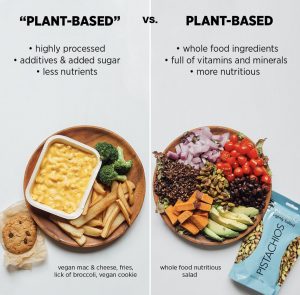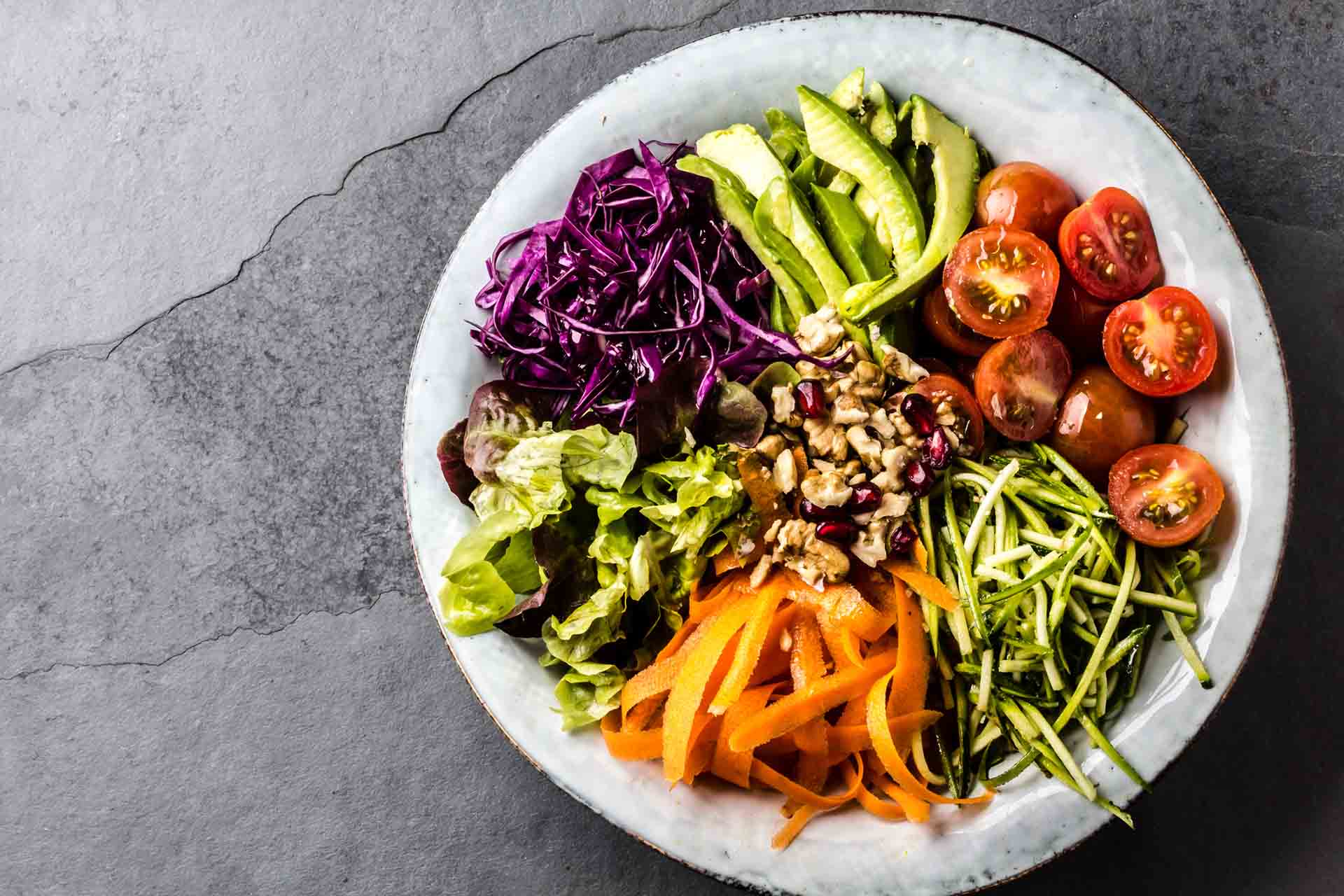Plant Based Beef vs. Traditional Meat: Which Is Better for the Environment?
Plant Based Beef vs. Traditional Meat: Which Is Better for the Environment?
Blog Article
Everything About Healthy And Balanced Food: Advantages of Enjoying Plant Based Choices
The discussion surrounding plant-based diet plans has acquired significant attention in recent times. Many people are discovering the possible health and wellness benefits, nutritional advantages, and ecological influences related to these dietary choices. As people come to be extra knowledgeable about their food's impact on wellness and sustainability, questions arise concerning the usefulness of embracing such a lifestyle. What specific adjustments can one expect, and how might these choices improve not only personal wellness however also the planet's future?
Recognizing Plant-Based Diet Plans
Lots of people connect plant-based diet regimens primarily with vegetarianism or veganism, these diets can incorporate a vast range of consuming patterns that prioritize entire, minimally processed plant foods. Such diet regimens commonly include fruits, veggies, whole grains, legumes, seeds, and nuts, while restricting or eliminating animal items. This flexibility permits individuals to tailor their nutritional choices according to individual choices and nutritional requirements. Some may embrace a primarily plant-based diet plan while still periodically consuming meat or dairy, commonly referred to as a flexitarian method. The emphasis continues to be on incorporating more plant foods, which can bring about a diverse range of tastes and meals. Comprehending these different analyses of plant-based consuming is important for valuing its access and appeal in contemporary food culture.
Health And Wellness Conveniences of Plant-Based Foods
The health benefits of plant-based foods are considerable, using a nutrient thickness advantage that sustains general health. Study suggests that these foods can boost heart health and play an important role in reliable weight management. By including a lot more plant-based choices, people may enhance their nutritional selections and promote long-term health.
Nutrient Thickness Benefit
Nutrient density plays a vital duty in the health advantages of plant-based foods, making them an engaging choice for those seeking a balanced diet. Plant-based foods, such as fruits, vegetables, legumes, nuts, and entire grains, are often rich in essential vitamins, minerals, and anti-oxidants while being reduced in calories. This high nutrient density allows people to consume fewer calories while still satisfying their dietary demands. Furthermore, these foods are packed with nutritional fiber, advertising gastrointestinal health and helping in weight monitoring. By incorporating nutrient-dense plant-based choices, consumers can improve their general health, support their body immune systems, and decrease the risk of persistent diseases. Eventually, the nutrient thickness of plant-based foods underscores their value in a health-conscious way of living.
Heart Health And Wellness Enhancement

Weight Monitoring Assistance
Along with advertising heart health, a plant-based diet can substantially aid in weight administration. This nutritional strategy emphasizes whole foods such as fruits, veggies, vegetables, nuts, and whole grains, which are typically reduced in calories and greater in fiber compared to animal-based items. The high fiber content helps enhance satiety, reducing overall calorie consumption. Plant-based diet regimens are commonly abundant in necessary nutrients while low in unhealthy fats, making it simpler to keep a healthy weight. Research study indicates that individuals who embrace a plant-based way of life often tend to have reduced body mass indexes (BMIs) and experience even more effective weight management compared to those that eat meat-heavy diet plans. Embracing plant-based alternatives is a calculated selection for effective weight administration.
Nutritional Value of Plant-Based Components
Plant-based ingredients are abundant in important nutrients, supplying a varied array of vitamins, minerals, and anti-oxidants that contribute to total health. A contrast of protein resources exposes that while pet items are commonly deemed exceptional, several plant-based choices provide adequate healthy protein and other helpful compounds. Recognizing the nutritional value of these components can help people make educated nutritional options.
Important Nutrients in Plants
Nutrient-rich components located in plants supply a diverse range of necessary nutrients that add considerably to overall wellness. These ingredients are abundant in vitamins A, C, and K, which support immune feature, vision, and blood clot, specifically. In enhancement, plants supply important minerals such as potassium, magnesium, and calcium, important for heart health and wellness, muscle mass feature, and bone strength. The presence of fiber in plant-based foods help food digestion and promotes a healthy gut microbiome. Anti-oxidants, found abundantly in vegetables and fruits, help battle oxidative anxiety and lower inflammation. In addition, many plant foods are reduced in calories yet high in nutrients, making them a superb selection for those seeking to maintain a healthy and balanced weight while ensuring optimal nutrient intake.
Comparing Healthy Protein Resources
Healthy protein resources differ significantly in their dietary accounts, with plant-based ingredients supplying one-of-a-kind benefits. Unlike animal healthy proteins, which often contain hydrogenated fats and cholesterol, plant proteins tend to be lower in these undesirable parts. Legumes, nuts, seeds, and whole grains are rich in essential amino acids, fiber, vitamins, and minerals. Lentils offer high protein material together with considerable iron and folate, while quinoa is a full healthy protein, using all nine vital amino acids. Furthermore, plant-based proteins are usually gone along with by antioxidants and phytochemicals that support total wellness. The shift to plant-based healthy protein resources not just boosts nutritional consumption yet also lines up with lasting dietary methods, lowering ecological influence and promoting long-lasting health and wellness benefits.
Environmental Effect of Plant-Based Eating
As recognition of environment adjustment grows, numerous individuals are discovering lasting dietary options that can greatly lessen their ecological footprint. Plant-based consuming has actually become a considerable contributor to reducing greenhouse gas exhausts, which are mainly related to livestock production. The growing of fruits, vegetables, beans, and grains generally requires fewer resources, such as water and land, contrasted to pet farming. Furthermore, plant-based diet plans can cause reduced logging, as much less land is needed for grazing animals or growing animal feed. By moving towards plant-based alternatives, consumers can support biodiversity and promote much healthier environments. Generally, accepting plant-based eating not only advantages personal wellness but additionally stands for an important step towards ecological sustainability and preservation efforts.
Conquering Common Misconceptions
While lots weblink of individuals acknowledge the benefits of a plant-based diet regimen, several mistaken beliefs typically discourage them from totally accepting this way of life. A typical belief is that plant-based diet regimens do not have adequate protein; nevertheless, many plant resources, such as vegetables, nuts, and tofu, supply ample healthy protein. Additionally, some assume that this diet regimen is costly, when as a matter of fact, staples like beans, rice, and seasonal veggies can be fairly economical. One more misconception is that plant-based eating is excessively limiting, whereas it really supplies a diverse range of foods and flavors. Lastly, numerous stress that a plant-based diet regimen might bring about deficiencies, yet with appropriate planning, individuals can acquire all required nutrients, consisting of minerals and vitamins, while enjoying a wide selection of delicious dishes.
Tips for Transitioning to a Plant-Based Way of life
Making the change to a plant-based lifestyle can be an enhancing experience, though it commonly needs some advice to navigate the initial modifications. Individuals are encouraged to start slowly, including even more fruits, vegetables, vegetables, and entire grains into their meals while minimizing meat and dairy intake. Meal planning is important; preparing a weekly menu can aid relieve the adjustment and stop last-minute undesirable selections. Checking out cooking techniques and brand-new dishes can additionally improve the experience and preserve excitement regarding plant-based eating. Additionally, signing up with assistance teams or neighborhoods can supply motivation and share important ideas. Staying notified regarding nutrition guarantees well balanced meals, preventing deficiencies while cultivating a healthy, satisfying plant-based way of life.

Delicious Plant-Based Dish Concepts
Discovering scrumptious plant-based dish concepts can motivate check my reference individuals to accept a more healthy diet regimen. One popular choice is a passionate quinoa salad, featuring cherry tomatoes, cucumber, and a spicy lemon-tahini clothing. Another favorite is a full-flavored lentil stew, packed with carrots, celery, and aromatic natural herbs, perfect for a reassuring supper. For morning meal, over night oats made with almond milk, chia seeds, and topped with fresh berries offer a nourishing beginning to the day. Additionally, a dynamic veggie stir-fry with tofu and a selection of vivid veggies can be a quick yet satisfying meal. Luscious avocado salute on whole-grain bread, sprinkled with flavors and seeds, uses an easy yet delicious treat. These dishes display the range and splendor of plant-based consuming.

Frequently Asked Inquiries
Can a Plant-Based Diet Plan Offer Enough Healthy Protein?
The question of whether a plant-based diet can give adequate protein is usual. Many sources, consisting of legumes, nuts, seeds, and entire grains, can satisfy protein requires efficiently, sustaining a balanced and nutritious diet regimen for individuals.
Are Plant-Based Diet Regimens Appropriate for Kid?
The suitability of plant-based diet regimens for kids relies on cautious preparation. Sufficient nutrients must be assured, consisting of healthy proteins, vitamins, and minerals. With appropriate guidance, such diet plans can sustain healthy development and development in kids.
How Do I Eat in restaurants on a Plant-Based Diet regimen?
Dining out on a plant-based diet regimen involves seeking dining establishments with diverse menus, requesting for modifications, and checking out vegan-friendly alternatives. Planning in advance and communicating dietary choices can boost the dining experience while preserving nutritional selections.
What Prevail Irritants in Plant-Based Foods?
Usual irritants in plant-based foods include soy, gluten, nuts, and seeds - BBQ Sauces. Individuals complying with a plant-based diet plan needs to know these allergens and check out labels thoroughly to avoid adverse responses and assure risk-free intake
Can Plant-Based Diets Aid With Weight Loss?
Study suggests that embracing a plant-based diet plan might promote Web Site weight loss due to its usually lower calorie density and higher fiber material. This combination can improve satiety, helping individuals manage their caloric consumption effectively. Many people associate plant-based diet regimens mostly with vegetarianism or veganism, these diet regimens can incorporate a vast array of consuming patterns that prioritize whole, minimally processed plant foods. Nutrient density plays an important function in the wellness benefits of plant-based foods, making them a compelling choice for those looking for a well balanced diet plan. Plant-based diet plans have been shown to significantly improve heart health, as they usually include elements that support cardio feature. In addition to promoting heart wellness, a plant-based diet plan can significantly aid in weight monitoring. A typical belief is that plant-based diets do not have adequate protein; nonetheless, various plant sources, such as beans, nuts, and tofu, supply sufficient healthy protein.
Report this page